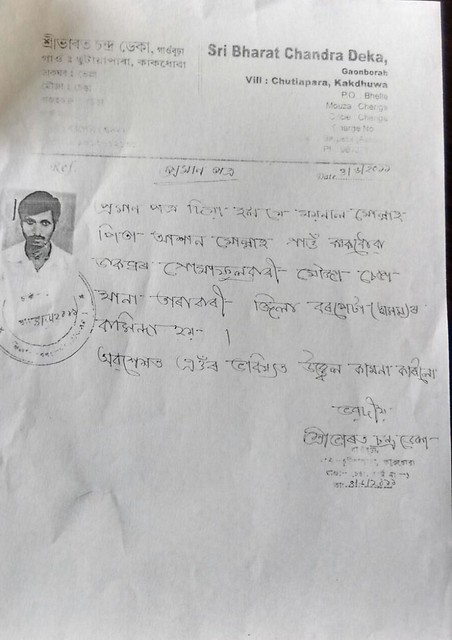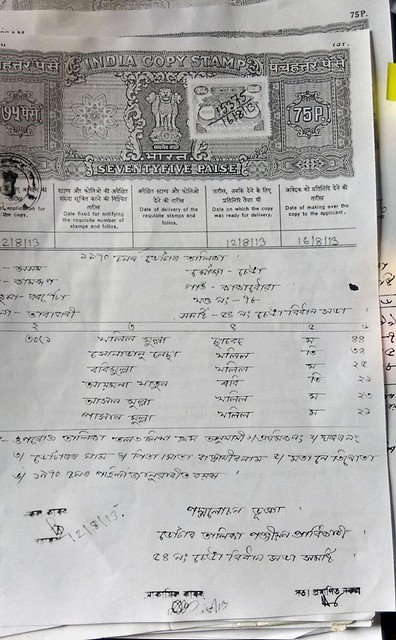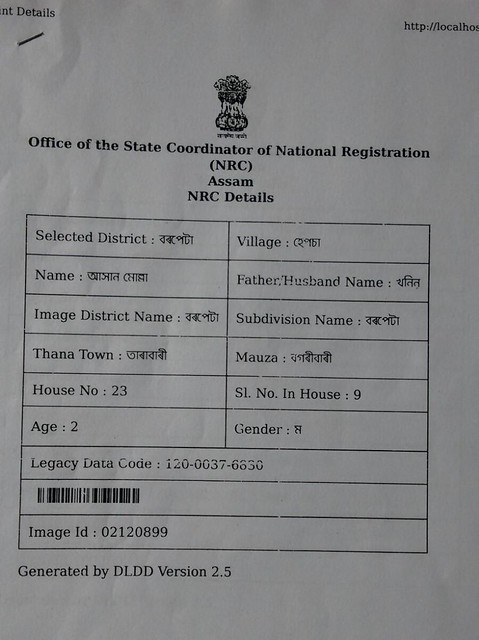Abdul Gani, TwoCircles.net
Guwahati: Asma Khatun (25) has been struggling with life under extreme circumstances where she has very slim chance of seeing her husband again though he is still alive. Asma got married to Moinal Mollah, of Barpeta district’s Bohri village, few years back and the couple also have two kids but the kids. But Mollah, now 30, was separated from his family two years ago.
Though Mollah’s parents and forefathers are Indians – they have all the valid documents – he has been kept in the detention camp since 2013 after he was pronounced as an ‘illegal or doubtful citizen’. What is worse that there is little hope of his coming out of the detention camp unless the Supreme Court intervenes.

“What do I do? We have been running here and there without any result. We are poor people and nobody wants to help us. How would we accept that my husband is a doubtful citizen when all his ancestors have been casting votes in the elections and have the land documents prior to even India’s independence,” a dejected Asma told TwoCircles.net.
How was Moinal Mollah declared a Foreigner?
In 1998 the Superintendent of Police, Barpeta made three reference cases namely Case No. 8225/1998, Case No. 8626/98 and Case no. 8627/98 to the then Illegal Migrants (Determination) Tribunals, Barpeta. On 06.11.03 the IMDT Tribunal, Barpeta declared that father and mother of Moinal Mollah are Indian citizens, based on the land deeds, NRC and other documents required to prove his citizenship.
The IMDT Tribunal did not take up Moinal Mollah’s case then. After IMDT Act got scrapped the reference case was automatically transferred to Foreigners Tribunal (2nd Tribunal) Barpeta.
Moinal Mollah duly appeared before the Tribunal on several occasions but was wrongly advised by his lawyer that as his parents have already been declared Indian citizen by earlier Tribunal, he need not worry and consequently he is not required to appear before the Foreign Tribunal’.

Owing to illiteracy and ignorance the petitioner never appeared before the Tribunal thereafter.
The Foreigners’ Tribunal, Barpeta, by its ex-parte Judgment and order dated February 16, 2010 held that the petitioner is a foreigner within the meaning of Sec (2) of the Foreigners Act, 1946. The petitioner filed a complaint against his counsel with the Bar Council and also made him a party in the High Court.
Subsequently, the petitioner filed a writ petition in Gauhati High Court, but the High Court on August 1, 2013 dismissed the writ petition ordering to deport Moinal Mollah.
On September 5, 2013 Molla was arrested by Police and since then he is at the Goalpara detention camp. The petitioner being aggrieved by the final order of aforesaid writ petition preferred a writ appeal before the division bench of Gauhati High Court.
But the court again dismissed the appeal on March 21, 2014. Moinal Mollah then filed a Revision Petition which too was dismissed on May 16, 2015 saying that it is time barred without going to the merit of the case.
The fact that Moinal Mollah’s parents and ancestors were citizens of India was ignored. His great grandfather, grandfather and father have voted since independence and their name feature in all voter lists made after the election. However, all these facts were ignored for no known reasons.
Asma says that Moinal Mollah’s grandfather had land documents in his name before independence; annual kheraj patta was issued in his grandfather’s name in the year 1938. Mollah’s grandfather and father’s names also feature in 1951 National Registration Certificate (NRC).
Is there any hope for Moinal Mollah
“Under these circumstances, Mollah has only one option to go to the Supreme Court and seek justice, otherwise he may have to spend his entire life in detention camp,” says Guwahati based advocate and civil rights activist Aman Wadud.
However, Mollah belongs to a very poor family and it’s almost impossible for the family to arrange the required fund to seek judicial remedy from the Apex Court.
Is this an isolated case?
What is more worrying that this is not a new or isolated incident in Assam where there are hundred others who face the similar fate. In spite of being born in India, some people are tagged as doubtful or illegal citizen and across their names in the voter’s list ‘D’ is marked.

Assam government has formed 500 state police units for detection of illegal immigrants in the state.
Besides, there are some other reasons as well, a section of advocates in the rural areas take advantage of the illiterate people and demand money assuring them to solve the problem.
This is the reason why many people do not appear in the Foreigners Tribunal.
According to the government data there are altogether 1,41,733 doubtful voters present in Assam, out of which, 33,944 have been declared as Indian citizens; while the fate of many still hang in balance.
Assam government recently created over 500 special police units to detain these people and has also been working on to increase the number of detention camp. The higher authority in police has already instructed those units to carry out their operations
A white paper published by Assam government in October, 2012 says that more than 92 percent of the resolved cases of ‘D’ Voters have been declared as genuine Indian nationals.
“Out of the remaining 8 percent cases, in most of those cases, the decree was awarded ex-parte or the doubtful citizen didn’t get the opportunity to prove their citizenship due to multiple reasons such as poverty, illiteracy, lack of access to proper judicial services, communication and transportation among others,” says Abdul Kalam Azad, a community worker.

